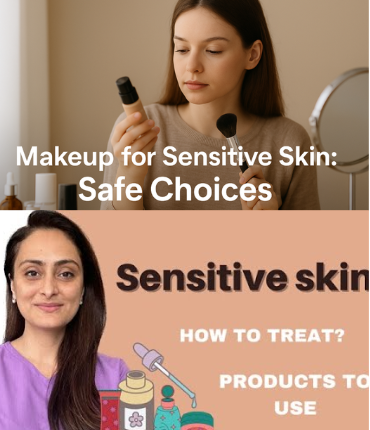
Sensitive skin can be tricky to manage. Between pollution, stress, and the pressure to always look presentable, finding the right makeup products often feels like walking through a minefield. One wrong choice and your skin reacts with redness, itching, or breakouts. But here’s the good news—having sensitive skin doesn’t mean you need to give up makeup. It just means you need to be smarter and more selective with what you use. Let’s explore how to choose the right products without risking irritation.
Why Sensitive Skin Needs Extra Care
Your skin acts like a protective barrier, but when it’s sensitive, that barrier is thinner and more reactive. Everyday irritants—fragrance, alcohol, pollution, or harsh chemicals—penetrate faster and trigger inflammation. That’s why people with sensitive skin often complain about stinging, burning, or rashes after trying new products. The goal isn’t to avoid makeup entirely, but to create a safe routine that enhances your look while protecting your skin’s delicate balance.
Always Go Fragrance-Free
Fragrance might make products smell luxurious, but for sensitive skin it’s a nightmare ingredient. Common fragrance additives like limonene, linalool, and ethylene brassylate are known irritants. Even artificial colors often used alongside fragrances can trigger allergic reactions. When shopping, scan the label for “fragrance-free” and “no artificial colors.” If it says “unscented,” be cautious—sometimes that still means masking fragrance chemicals are present.
Say No to Alcohol-Based Formulas
Alcohol is another hidden culprit. Certain drying alcohols found in toners, foundations, and primers strip away natural oils, leaving skin fragile and inflamed. The tricky part? Damage from alcohol doesn’t always show up after one use. With repeated application, especially from leave-on products, it gradually makes skin even more sensitive. The rule of thumb: avoid anything that lists alcohol high on the ingredient list.
Ingredients to Avoid at All Costs
Some chemicals are notorious for irritating sensitive skin. Keep an eye out for these red flags:
- Sodium Lauryl Sulfate (SLS)
- Bismuth Oxychloride
- Acetylated Lanolin Alcohol
- Beta Hydroxy Acids (BHAs) in strong concentrations
- Formaldehyde and formaldehyde releasers
- Boric Acid
- Parabens
- Para-Aminobenzoic Acid (PABA)
- EDTA
- Petrolatum in heavy, pore-blocking forms
Think of these as “skin bullies”—they may promise benefits but end up breaking down your skin’s defense system.
Video : Sensitive skin | Why does it happen | How to treat | Product to use | Dermatologist | Dr. Aanchal
Choose Mineral Sunscreens Over Chemical Ones
Sunscreen is non-negotiable, even for sensitive skin. But chemical filters like oxybenzone and octyl methoxycinnamate (OMC) can penetrate deeply and cause irritation, allergies, and in some cases, long-term health concerns. Instead, opt for mineral-based sunscreens with zinc oxide or titanium dioxide. These sit on top of the skin, act as a shield, and are far less likely to cause flare-ups. Plus, they’re often recommended by dermatologists for hypersensitive or post-treatment skin.
Pick the Right Makeup Remover
Your makeup remover should be as gentle as the products you apply. Many removers contain hidden alcohols or fragrances that undo all your careful product choices. Micellar water designed for sensitive skin, oil cleansers with minimal ingredients, or cream-based removers are safer bets. Always avoid harsh scrubs or wipes that can strip and irritate your skin.
Test Before You Commit
Even if a product ticks all the right boxes—fragrance-free, alcohol-free, hypoallergenic—never skip a patch test. Apply a small amount on your jawline or behind your ear, then wait 24 hours. If there’s no reaction, it’s safer to use on your whole face. This step might feel slow, but it can save you from a full-face breakout or rash later.
Look for Dermatologically Tested and Hypoallergenic Labels
Labels matter. Non-comedogenic products won’t clog pores, while hypoallergenic formulations are designed to reduce the risk of allergic reactions. Also, products with added antioxidants like vitamin E or green tea extract can help calm inflammation and provide extra protection. Non-greasy, moisturizing textures are especially useful for maintaining balance without suffocating your skin.
Don’t Forget About Hygiene
Even the best products can cause irritation if your tools are dirty. Makeup brushes, sponges, and applicators harbor bacteria that sensitive skin can’t tolerate. Wash brushes at least once a week with a gentle cleanser and dry them completely before using again. Store your products in a cool, dry place to prevent contamination. Think of it this way: clean tools equal calm skin.
Choosing Your Makeup Routine Wisely
When in doubt, follow the “less is more” philosophy. Stick to lightweight foundations or BB creams, skip heavy powders, and lean into cream formulas that hydrate instead of drying your skin. Focus on enhancing your natural features with gentle, breathable products. Sensitive skin doesn’t mean no makeup—it means smarter, kinder makeup.
Video : 5 Best Foundation for Sensitive Skin
Conclusion
Choosing makeup products for sensitive skin isn’t about sacrifice; it’s about strategy. By avoiding harsh ingredients like fragrance, alcohol, and chemical sunscreens, and by focusing on hypoallergenic, non-comedogenic, and dermatologist-tested formulas, you can enjoy makeup without fear of irritation. Add a layer of protection with mineral sunscreens, always patch test new products, and keep your tools squeaky clean. In short, treat your skin with care, and your makeup will look better—and feel better—than ever.


